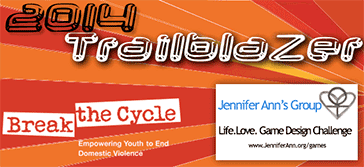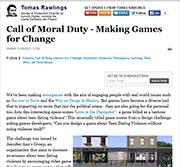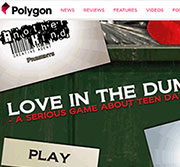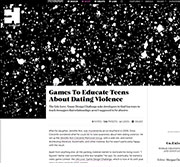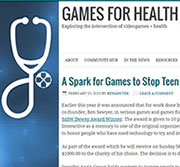
2015 Life.Love. Game Design Challenge
Video games preventing teen dating violence. Presented by Jennifer Ann's Group.
In 2008 Jennifer Ann's Group launched the Life.Love. Game Design Challenge and has run the contest every year since.
The contest commences every February to coincide with the National Teen Dating Violence Awareness and Prevention Month
and is the largest and longest running event of its kind utilizing video games to prevent violence.
Winning games have come from Argentina, Belgium, Canada, India, Ireland, Mexico, Thailand,
and the United States of America.
This year's challenge is our most challenging-est challenge ever.

Challenge: Can you create a video game about teen dating violence . . .
without using violence in the game itself
incorporate real-world data and events
empower video game players
foster advocacy?
Crowdsourcing:
teen dating violence
In the past, our contests have focused on educating game players.
This year we are adding the challenges of increasing awareness and fostering advocacy within
the context of a game.
This will be accomplished through the incorporation of web services.
Increasing Awareness
Generally, there are three groups that we are targeting for awareness.
Abusers: How to increase awareness among people who are
currently engaged in abusive dating behavior; have engaged in abuse in the past; or are likely to engage in
abusive behavior in a relationship in the future?
By increasing awareness of abusive behavior among this group of people, they will be able to better identify
if their own behavior in a relationship is unhealthy.
Bystanders: How to increase awareness among people
not in the abusive relationship?
People in this group include friends, parents, teachers, and strangers who witness abusive behavior.
By increasing awareness of dating abuse among this group of people, they will be able to better identify
if other people are in an unhealthy relationship.
Victims: How to increase awareness among people
who are on the receiving end of abuse in a dating relationship? (Note: the label of "victim" is not accurate
because many people are actually "survivors" of abuse but we will refer to "victim" for the sake of clarity.)
By increasing awareness of dating violence among this group of people, they will be able to better identify
if the relationship that they are currently in - or have been in before - is abusive.
Fostering Advocacy
Although game players interact with the games which we have produced, generally any communication
with the games has been one-way and one-time;
once the game was installed no further transfer of data (or knowledge) occurred.
Engagement: How to engage game players
in new ways which are more interactive, allowing them to communicate back to the community?
By increasing player engagement, the game will provide an ever-changing landscape with new
challenges and rewards to promote repeated playing.
Empowerment: How to empower game players
to participate in an ongoing examination of abusive behavior?
By increasing player empowerment, the game will allow the player to take an active part
in examining what is - and isn't - abuse and the impact on society and our relationships.
Game
Although not everybody might define "game" the same way, here are some general attributes:
Goals and Challenges
Rules and Constraints
Interaction and Competition
Enjoyable
Gamification: How to incorporate elements
of goals and challenges, subject to rules and constraints, in an interactive and competitive
(+enjoyable) way?
By integrating game elements the game will be more effective as a tool for education, awareness, and advocacy.
A female game player is at a mall. In a clothing store she sees two friends from school, a male and female who are dating.
The male is telling the female to not bother trying on a skirt because he is "never going to allow
her to wear it in public."
The player rightly recognizes that this behavior by the male is unhealthy and controlling.
The player also recalls the week before when she told her own boyfriend to "change his jeans if you expect
to be seen with me."
The player rightly recognizes her own behavior as unhealthy and controlling.
The player takes out her phone to play the game. She notices that a headline from a news app indicates
that a popular television actor was arrested for physically assaulting his boyfriend.
The player rightly recognizes that this actor has been charged with behavior which is abusive.
This player then logs three incidents in the game:
- (1) the incident which she witnessed today;
- (2) the incident in which she had participated the previous week; and
- (3) the incident which was reported by the news.
Based on this interaction the game rewards the player with:
- 10 pts: recognizing emotional abuse as bystander
- 15 pts: recognizing emotional abuse as abuser
- 5 pts: recognizing physical abuse as bystander
- 5 pts: recognizing physical abuse by a
celebrity reported in national news
- 10 pts: bonus for being the first player to log an abuse
incident reported in national news *
- 3 pts: third consecutive day of interacting with the game
-
- * If this incident is subsequently reported by more than 50 other players
the player receives an additional 5 bonus pts the next time she logs in.
A few additional notes.
The above is merely an example of increasing awareness and fostering advocacy using game elements.
Feel free to come up with your own ideas (and to incorporate these ideas if you wish).
Use of geolocation by IP or GPS (coarse) is acceptable but not GPS (fine) or anything else which
would compromise or reveal a user's exact location.
Similarly, tracking players by some token or authentication is
okay if the player has provided informed consent,
but no personally identifiable information (PII) can be stored, tracked, or measured.
If in doubt, ask for clarification.

Sponsored by

2015 Life.Love. Game Design Challenge | Rules
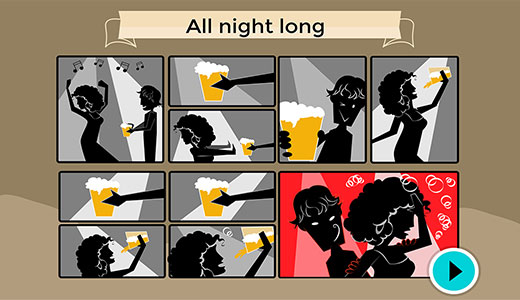
1st Place, 2014, "The Guardian: TDV Missions" from 99UNO, Argentina
Frequently asked questions and official rules for Jennifer Ann's Group's annual video game design competition.
Frequently Asked Questions
What are the important dates for the video game design contest?
- Contest begins: February 23, 2015
- Entry deadline: June 1, 2015.
- Winners announced at the 2015 Summer Game Jam in June 2015 (date TBA).
Who is eligible to compete?
- At the time of entry you must be 13 years of age or older (void where prohibited).
- Officers, employees, and immediate family members of Jennifer Ann's Group
are prohibited from entering the video game design contest.
What technical requirements are there for the game?
- All games must be designed to run on Android 4.x+, HTML5, iOS 6.x+,
Unity Web Player, or Windows Phone 8.1+.
- All games must use a web service to allow players to interact with the game.
Amazon Web Services
has a free service "AWS Free Tier" which we recommend.
Details: https://aws.amazon.com/free/
- The use of built-in sensors and capabilities of smartphones and tablets is
encouraged. However, this must be balanced against the need to respect
the player's privacy as well as security concerns.
► For example, using IP geolocation or GPS (coarse) to identify the player's
regional location would be acceptable but using GPS (fine) to identify the
player's precise location would not be acceptable.
► Likewise, providing players
the ability to create an account with a username and / or city
for purposes of a leaderboard or to track achievements would
be acceptable. However it would not be okay to capture
any personally
identifiable information (PII). PII includes name, date / place of birth,
and IP address.
Feel free to ask for clarification
(contest @ Jennifer Ann.org)
- we will post questions and answers
on Jennifer Ann's Group's
Google+ page as they become available for the
benefit of all entrants.
- Games must be fully functional at time of entry.

How do I enter?
- Sign up through our online registration form below
TIP: Follow Jennifer Ann's Group's
Google+ page for any updates or clarifications about the contest.
- After registering, all entrants will receive a 400 x 200 image
identifying Jennifer Ann's Group as the sponsor of the contest.
This image must be placed on the game entry's splash screen with a link
to our online video game portal.
(JAGga.me)
- Create a video showing your game in action! Video must be 30 to 120 seconds in length.
Details will be sent upon contest registration.
Can I enter more than once?
- Sorry, but no. Make sure and enter your best game because you only get one
chance to enter each year! (You are welcome to make changes to your entry and
resubmit it prior to the deadline however.)
What are the Prizes?
- First Place: $8,000
- Second Place: $1,200
- Third Place: $600
- Door Prize (selected at random from the eligible non-winning entries): $200
What criteria will be used for judging?
- All games will be reviewed to ensure that they meet all contest requirements.
TIP:Remember, the game: must not include any on-screen violence;
must increase advocacy; and must foster advocacy!
- Three (3) winning entries will then be chosen based on the following weighted scoring
criteria and One (1) entry will be randomly drawn from the remaining non-winning
entries to receive the door prize.

1st Place, 2013, "Love in the Dumpster" from Jean HEHN, Belgium
Scoring Criteria
Educational Value (20%)
- Does the game provide information about dating violence?
- Are there examples of potentially abusive behavior?
- Does the game suggest safety plans?
- How effective is the game at providing sources for assistance?
Entertainment Value (20%)
- Playability
- Innovative approach to game play design
- Graphics and music
- Re-Playability
- Intuitive gameplay
Increasing Awareness (20%)
- Awareness among abusers, bystanders, and victims (as discussed above)
Fostering Advocacy (20%)
- Increasing Engagement and Providing Empowerment (as discussed above)
Game Elements (20%)
- Goals, Challenges,
Rules, Constraints,
Interaction, Competition, and
Enjoyable (as discussed above)
Who are the judges for this year's contest?
2015 judges
Our fantastic judges are experts in video game design and teen dating violence.

Dr. Ian Bogost, Ph.D.
Dr. Ian Bogost is an award-winning videogame designer and media philosopher. He is Associate Professor at Georgia Tech and Founding Partner at Persuasive Games LLC. He is also the author or co-author of seven books, including Unit Operations, Persuasive Games, Racing the Beam, Newsgames, and the forthcoming How To Do Things with Videogames and Alien Phenomenology. His most recent game, A Slow Year, won the Vanguard and Virtuoso awards at the 2010 Indiecade Festival.

Simon Carless
Simon Carless is an EVP at UBM Tech, overseeing the Game Developers Conferences in San Francisco, Los Angeles, Germany, and China. He also oversees the double Webby award-winning Gamasutra website, and the Black Hat information security conferences. He has previously worked as a lead game designer at Kuju Entertainment, Eidos Interactive and Atari.

Brian Crecente
Brian Crecente is a journalist and columnist, a founding editor and the News Editor for Polygon, he also writes Good Game, a weekly column internationally syndicated by McClatchy-Tribune Information Services. Crecente was named one of the 20 most influential people in the video game industry over the past 20 years by GamePro in 2009 and one of gaming's Top 50 journalists by Edge in 2006. He was featured in a 5280 biography. He has spoken at the Smithsonian, GDC, PAX and UCLA. Crecente is married and has one child. He is Jennifer Ann Crecente's uncle.

Dr. Kristen Jozkowski, Ph.D.
Dr. Jozkowski earned her Ph.D. in Health Behavior with a minor in Mixed Research Methodology at Indiana University in 2011. While at Indiana University, Dr. Jozkowski was the research coordinator for the Center for Sexual Health Promotion and worked with the Kinsey Institute for Research in Sex, Gender and Reproduction, research collaborations she still maintains in her position at the University of Arkansas. Dr. Jozkowski is currently an Assistant Professor in Community Health Promotion in the Department of Health, Human Performance and Recreation and is affiliate faculty in Gender Studies in the J. William Fulbright College of Arts & Sciences.

Dr. Natasha E. Latzman, Ph.D.
Natasha E. Latzman, Ph.D. is a Behavioral Scientist in the Division of Violence Prevention at the National Center for Injury Prevention and Control at the Centers for Disease Control and Prevention. Her research focuses on the prevention of violence against children and youth and the promotion of healthy teen relationships. She is currently the Acting Lead of the Division’s comprehensive teen dating violence prevention initiative, Dating Matters®: Strategies to Promote Healthy Teen Relationships. Natasha received her B.S. in Human Development from Cornell University and her Ph.D. in Clinical Psychology, with a specialization in law/psychology, from the University of Nebraska-Lincoln.

Dr. Jon A. Preston, Ph.D.
Dr. Preston is the founder and coordinator for the Center of Applied Gaming and Media Arts (CAGMA) and coordinator of the Computer Game Design and Development degree and Associate Professor at Kennesaw State University (previously Southern Polytechnic State University). He has authored over 40 papers and is particularly interested in game simulation, social space development, and the use of these technologies to improve learning. Dr. Preston has been teaching computing for nearly 20 years and has taught game development over the past 8 years including mobile, casual, and serious game development. In the past 5 years, he has hosted many game jam weekends totaling over 200 games developed by more than 1,000 participants. Dr. Preston also serves on the Academic Committee of the Georgia Game Developers Association; is the College Fair Coordinator for the Southeastern Interactive Entertainment and Games Expo; and participates on the Entertainment Engineering Subcommittee of the American Society of Mechanical Engineers.

Joanna Sharpen
Jo Sharpen is the manager of the Children and Young People's Project at AVA (Against Violence and Abuse) in the U.K. and wrote the national U.K. toolkit on children, young people and domestic violence for practitioners, Improving Safety, Reducing Harm, published by the Department of Health in 2009. She has also written numerous policy briefings, guidance and training packages on violence against women and girls; currently she is writing a book on domestic violence in teenage relationships.
Where can I learn more about teen dating violence?
Information including online resources is available in our TDV section below.
- All entrants must be 13 years of age (or older) at the time of entry.
- Entries can only contain graphics or audio that the entrants have rights to use
(e.g. works in the public domain; original creation by the entrant; rights granted by the rights owner).
- Entries cannot contain on-screen violent content or have a pervasive theme of violence
and should be age-appropriate for ages 13 and up.
- Entries must include elements to "increase awareness" of dating violence. Examples and clarification
are available on the contest page.
- Entries must include elements to "foster advocacy" related to dating violence. Examples and clarification
are available on the contest page.
- Entries must use a web service to allow interactivity between the player and the game and / or between players
themselves. The use of any web services as well as the use of any sensors in the player's hardware must
not infringe on the player's right to privacy and must follow appropriate security protocols. Further discussion
and examples related to privacy and security are including on the
contest page with updates on
Jennifer Ann's Group's Google+ page. We recognize that
this requirement is not easily defined but will be guided by the spirit of this rule:
The game should be as engaging, immersive, and interactive as possible without
sacrificing anybody's privacy or security.
- Entries must be functionally error-free and ready to run "as-is."
- Entries cannot include branding for third-party organizations (text acknowledgements are acceptable).
Jennifer Ann's Group will supply a 400x200 image that identifies them as the sponsor -
this image will be placed on the entry's splash screen.
- Entries must be playable with Android 4.x+ HTML5, iOS 6.x+, Unity Web Player, or Windows Phone 8.1+.
- Entries must include a separate 30-120 second video showing actual gameplay of the entry.
- Jennifer Ann's Group and any other entity associated with this contest are not responsible
for any lost or misdirected entries. All entries must be received by June 1, 2015 at 11:59PM (GMT-4).
- As a condition of receiving their prize, winning entrants must grant Jennifer Ann's Group the
non-exclusive, royalty-free, licensable, non-assignable rights to the: compiled, object, and source code;
necessary media files; and associated intellectual property rights of their entry for republishing,
promotion, and internal use.
- Winning entrants agree to electronically provide all of the assets necessary to facilitate
Jennifer Ann’s Group’s rights to publish, promote, and utilize their entry in any format or language and on any
platform currently known or yet to be invented in order to promote the awareness of and prevent Teen
Dating Violence worldwide.
- Entrants also give their consent to Jennifer Ann’s Group and to those whom Jennifer Ann’s Group may
authorize, to photograph, film, videotape, and/or to use a photographic/digital reproduction of their
2015 Life.Love. Game Design Challenge entry with or without their name, to identify them by name, and/or
to quote or record statements made by them, for any editorial, promotional, marketing, or other purpose
related to the mission of Jennifer Ann's Group (“the prevention of Teen Dating Violence through
Awareness, Education, and Advocacy”). This consent does not extend to the purposes of endorsement of
product or service advertising for any unrelated third parties.
Winner Selection
- Finalists will be chosen by the Selection Committee that will be comprised of a group of Video Game experts and Teen Dating Violence experts.
- Finalist selection will be based on the scoring criteria as set forth in the Scoring Criteria section.
- Of the three finalists, one will be chosen by the Selection Committee as the First Place Prize Winner; one will be chosen as the Second Place Prize Winner; and one will be chosen as the Third Place Prize Winner.
- A "door prize" winner will then be randomly selected from those entries not chosen as winning entries.
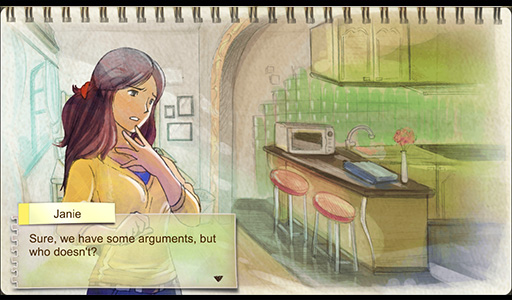
2nd Place, 2013, "Janie's Sketchbook" from GPTouch, Thailand
Scoring Criteria
Educational Value (20%)
Entertainment Value (20%)
Increasing Awareness (20%)
Fostering Advocacy (20%)
Game Elements (20%)
Prizes
- The First Place Winner will receive $8,000 ("First Place Prize").
- The Second Place Winner will receive $1,200 ("Second Place Prize").
- The Third Place Winner will receive $600 ("Third Place Prize").
- The "door prize" winner will receive the prize of $200.
Note:
Entrants are responsible for any federal, state, and local tax consequences
and for compliance with all governmental reporting and payment requirements.
Winning funds will be sent in U.S. Dollars via cashier's check or via PayPal
(at the option of the winners); please note that winners will be responsible for any fees
assessed by PayPal if they prefer to receive their winnings via PayPal
(there is no cost associated with receiving winnings via cashier's check).
General Rules
- Prize winners will be required to sign and complete an Affidavit of Eligibility
and a Liability and Publicity Release (where legally permissible) and return the signed documents
within ten (10) days of receipt of attempted delivery, otherwise the Entrant may be forfeited
and the Entrant with the next highest score will be selected.
- In the event that a prize winner
is under the age of 18, a parent or guardian will instead have to sign the Affidavit of Eligibility
and the Liability and Publicity Release (where legally permissible).
- The prize winners will also electronically provide all source files and components necessary
to re-create the winning game on another platform and / or to localize the game for another country if Jennifer Ann's Group so decides.
- Additionally, the prize winners give Jennifer Ann's Group the right to the Entrant's name,
voice, picture, portrait and likeness for advertising and promotion purposes without further
compensation, where permitted by law.
- These Official Rules and all matters related to the Contest will be governed by the laws of the State
of Georgia U.S.A., without regard to its conflict of laws principles.
Limitation of liability
- The organization and its directors, officers, shareholders, employees, advertising and promotion agencies
involved in this contest shall have no liability and shall be held harmless by entrant, and any team members
of entrant, for any damage, loss, or liability to person or property, due in whole or in part, directly or
indirectly, by reason of entering the contest, the acceptance, possession, use, or misuse of any prize, or
while preparing for, participating in, and/or, traveling to and from any contest-related activity.
- Any and all claims, judgments, and awards shall be limited to actual out-of-pocket costs incurred,
including costs associated with entering this Contest, but in no event attorney's fees. Jennifer Ann's Group
and its promotion and advertising agencies are not responsible for technical, hardware, software, or
telephone failures of any kind, lost or unavailable network connections, fraud, incomplete, garbled or
delayed computer transmissions, whether caused by Jennifer Ann's Group, users, or by any of the equipment
or programming associated with or utilized in the Contest.
Tampering
- If for any reason the Contest is not capable of running as planned, including infection by computer virus,
bugs, tampering, unauthorized intervention, fraud, technical failures, or any other cause beyond the control
of Jennifer Ann's Group that corrupts, impairs or affects the administration, security, fairness, integrity,
or proper conduct of this Contest, Jennifer Ann's Group reserves the right, in its sole discretion, to
cancel, terminate, modify, extend or suspend the Contest and/or prizes.
- Jennifer Ann's Group reserves the right to disqualify any individual who tampers with or in any way corrupts
the entry process. Jennifer Ann's Group may prohibit an Entrant from participating in the
Contest or winning a prize if, in Jennifer Ann's Group's sole discretion, they determine that said Entrant
is attempting to undermine the legitimate operation of the Contest by cheating, hacking, deception,
or other unfair practices or intending to annoy, abuse, threaten or harass any other entrants
or Jennifer Ann's Group's representatives.
2015 Life.Love. Game Design Challenge | Register
2015 Life.Love. Game Design Challenge | Teen Dating Violence Information
Statistics, citations, and online resources for more information about dating violence.

Teen Dating Violence Statistics
- Forty-four percent of college graduates have been in an abusive relationship.
1
- Teen dating violence is related to health problems in adulthood.
2
- In the U.S. alone almost 1.5 million high school students
are physically abused by a dating partner every year.
3
- Nearly 40% of adolescents have been physically or sexually abused
by a dating partner.
4
- More than 1/3 of women and 1/4 of men experience rape, physical violence,
and/or stalking by an intimate partner. 5
- Teenagers who experience dating violence are 4x - 6x more likely to become
pregnant.
6
- Teens who have been in abusive relationships are more likely to feel hopeless and
attempt suicide. 7
- Adolescents who have experienced dating violence are more likely to experience
violent relationships as an adult.
8
- Teenagers in abusive dating relationships are more likely to smoke, binge drink,
and use drugs.
9
Citations
1.
Forke CM, Myers RK, Catallozzi M, Schwarz DF.
Relationship Violence Among Female and Male College Undergraduate Students.
Arch Pediatr Adolesc Med. 2008;162(7):634-641.
2.
Exner-Cortens, D.; Eckenrode, J.; & Rothman, E. (2013).
Longitudinal associations between teen dating violence victimization and adverse health outcomes.
Pediatrics, 131(1), 71-78.
3.
Love is Respect //www.loveisrespect.org/is-this-abuse/dating-violence-statistics
4. Halpern, et al.
Patterns of Intimate Partner Violence Victimization from Adolescence to Young Adulthood
in a Nationally Representative Sample Journal of Adolescent Health. (2009); 45(5): 508–516.
5.
Centers for Disease Control and Prevention. (2011).
National
Intimate Partner and Sexual Violence Survey
6.
Silverman, J., Raj, A., Mucci, L., & Hathaway, J. (2001).
Dating Violence Against Adolescent Girls and Associated Substance Abuse,
Unhealthy Weight Control, Sexual Risk Behavior, Pregnancy, and Suicidality.
Journal of the American Medical Association. 286(5): p. 572-279.
7.
Howard, Yang, & Fan, 2009; CDC, 2005.
8.
Smith et al., 2002; CDC, 2005.
9.
Silverman, Raj, Mucci, & Hathaway, 2001.
Winning Games from the Life.Love. Game Design Challenge: Critiques & Postmortems
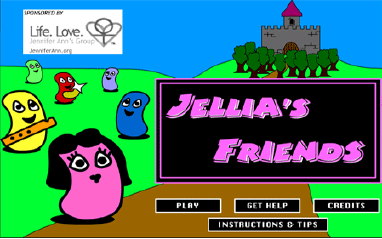
Since 2008, the organization Jennifer Ann's Group has sponsored an annual Flash game development
contest in an effort to raise awareness about the dangers of teen dating violence. In 2010,
intrigued by the challenge of making an educational game and happy to do something to support a
cause like preventing dating violence among teens, I submitted an entry called Jellia's Friends.
Now, over a year later, I wanted to revisit this project, not because it really deserves attention
as an especially high quality educational game (it's not), but rather because I want to reflect
on what I learned from my first attempt at making an educational game.
read the full article at brainsforgames|gamesforbrains

A few months ago, I helped write some dialogue for a game called YourSpace (with Paul Andrew McGee, Sam Gross, Ross McWilliam, and kayfaraday). The game was created for the Life.Love. Game Design Challenge held yearly by The Jennifer Ann Crecente Memorial Group, and was designed to address the issue of teen dating violence. Our game was a dialogue-heavy interactive story, with branching paths inspired by hypertext fiction. All of the game’s interaction happens within the context of a fictitious social network. While I was pleased with the final project (which placed third), I’ve been thinking lately about the way we tend to explore issues like dating violence when approaching development from a “serious games” angle.
read the full article at lyndseyjane.com
Online Resources about TDV
International TDV Resources
2015 Life.Love. Game Design Challenge | Design, Develop, Create
We suggest that you first learn about the issue of teen dating violence and then focus on how best to incorporate
gamification concepts into the crowdsourcing challenge which we have presented to you this year.
The concept behind your entry is ultimately more important than the look and feel of its design.
We recommend the use of AWS Free Tier from Amazon: https://aws.amazon.com/free/
Tip:If you haven't played any of the winning games from past contests it might help to play them.
In addition to the games on this screen we also
have these past contest winners.

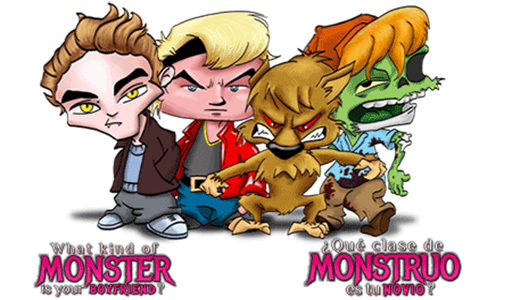
What Kind of Monster is your Boyfriend?
Runner Up, 2013, "What Kind of Monster is Your Boyfriend?" from 99Uno, Argentina
What Kind of Monster is your Boyfriend takes a light-hearted look at our culture's fascination with
teen vampires, werewolves, and zombies. This is our first bilingual game and can be played in either English
or Spanish.
Remember:
You have until June 1, 2015 to submit your game!






















